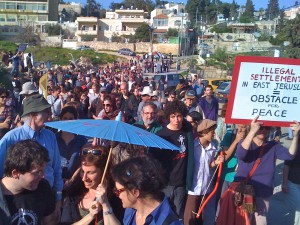
Max Blumenthal has been raging against the official inclusion of the massive, strategically placed settlement of Ariel in the #J14 housing protest movement. (See Max’s Sunday post and Twitter stream.) I have to strongly disagree with his position, and I would argue that social justice for all, even the settlers, is a good goal and a good start.
I should preface this by saying that I’ve been following Max’s blog for months and this is the first time I ever strongly disagree with him; I think Max is an excellent journalist and activist and I believe we share many core values. I also agree with his assessment that the settlements, Ariel in particular, are unacceptable on multiple levels: they are built on stolen land, make people’s lives miserable (to put it mildly), and have done much to intensify and prolong the conflict.
However, the fact that the residents of Ariel are part of a horrendous crime does not mean they are not the victims of the Israeli socio-economic and political system along with the rest of us. No doubt, any person who knowingly makes the choice to move there is making themselves part of the occupation. But the fact that the settlements have grown so slowly despite massive government support, and the fact that only about a third of the West Bank settlers are ideological, tells me that the West Bank is hardly anyone’s first choice for location. Since stolen land tends to be the cheapest kind, especially when it’s also subsidized, there has always been a strong economic incentive to move to the settlements. The people who end up making that choice are people who, like the rest of us, were not able to achieve the standard of living they aspired towards, but made a dubious choice (one supported by many vocal members of society and government.)
Let me be clear: nothing can justify the choice to be part of the colossal crime of the settlements. But making that wrong choice does not make a person or their family less of a victim.1
But making this about the wrongs perpetrated or perpetuated by different parts of Israeli society is the wrong way to go. I’d say it plays right into Netanyahu’s hands, and goes along perfectly with the economic and social system of Israel, pitting sectors of the populations against one another. If Netanyahu had his way, J14 would exclude the settlers (alienating big parts of the right), it would exclude non-Jews (alienating big parts of the left) and it would be almost entirely a movement of spoiled young Ashkenazis whose parents and grandparents were part of the old elite (alienating almost everyone else). With that kind of movement, Netanyahu could just sit tight and wait for it to blow over.
But since the movement is radically inclusive – going both against mainstream prejudice (e.g. that the Arabs are not part of this society) and the prejudice of many activists (e.g. that all settlers are the enemy) – it is able to actually achieve something, and so far has not made an enemy of any major sector of society. Only the government and some far-right nationalists seem strongly against the whole thing. And this openness is undermining vital underpinnings of the occupation – whether J14 acknowledges the connection or not.
How? First and foremost, it has ended the prevailing apathy in much of society and made it possible to discuss almost anything. People are very publicly talking about racism, the division of resources, even the use of “security” to silence social movements, and many people are actually listening. This won’t end the occupation tomorrow or in a month, but then nothing else could, either. In the longer run, it sets the stage for major changes to happen, and we may find many more people willing to listen than we did before. The movement seems to be redefining “left” and “right” so that for many people, being a “leftie” isn’t the absolute worst possible thing ever anymore.
Moreover, the movement’s focus on the division of resources will make it very difficult for future governments to act as if the settlements are the only part of the country worth their attention (as this government sometimes has). The movement may well work against the interests of the settlement movement while at the same time working in the interests of individual settlers. These interests are not identical.
Finally, with general welfare now at the center of the public agenda, and general disillusionment about the government’s narrative, many people will be reminded of how peace is in their own interest and refuse to buy excuses for maintaining the current line of policy.
I think it is unrealistic to expect immediate solutions from J14 – whether for social issues or political ones. There’s a lot of work ahead and absolutely nobody can predict how things will go. But looking for excuses to distance oneself from J14 plays only into the hands of the status quo.2

Footnotes
- In the same way, the generation that started this country was both victim and perpetrator, and the two do not cancel each other out — the victimhood does not cancel out the atrocities as the right would have it, and the atrocities do not cancel out the victimhood as some in the far left would have it. [↩]
- And anyone who doesn’t see their position or background represented in the movement should stop whining, go out and make their voice heard. The only thing stopping you is you! [↩]
